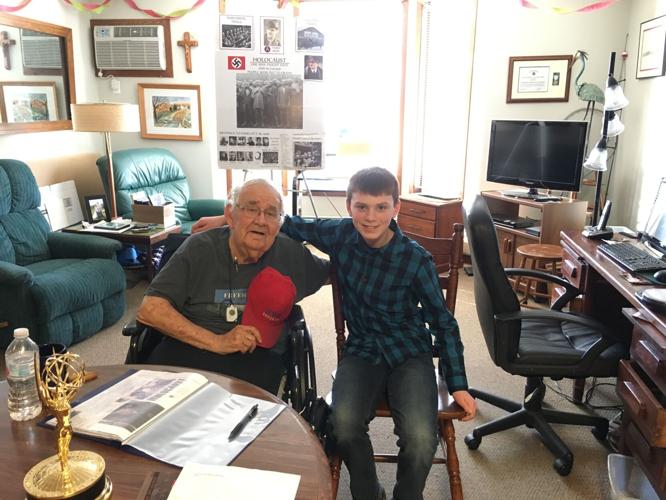In choosing a subject for his sixth-grade history project at Oltman Middle School, Caleb Craig traveled down a dark corridor in time.
Caleb, who lives in St. Paul Park, became intrigued by the Nuremberg trials, the international military tribunal convened by the Allies in 1945 to bring Nazis to justice following World War II.
"I really didn't know many things about World War II," Caleb, 12, said.
He discovered the trials after his research on a different subject led him to the story of Nazi leader Rudolf Hess, who was one of the defendants at Nuremberg.
"That led me to the trials," he said.
Caleb said it was outrageous - but interesting - how the accused justified or denied their crimes.
"I tried not to draw conclusions on people," he said. "This one guy, Hjalmar Schacht, he was super interesting. He said he hated Hitler and different stuff like that. That was his approach. Is he telling the truth? Is he lying? I think he was mostly lying."
Caleb is one of several students who plan to enter their projects in the National History Day competition, social studies teacher Amy Johnson said.
"I have some kids who are doing some amazing projects with other topics," she said.
Whether their subject is the Dakota War of 1862 or the Glensheen Mansion in Duluth, students are required to include primary sources in their research, Johnson said. These can be eyewitness accounts, newspaper stories, photos, journals or manuscripts from the period under study.
Caleb tracked down two important primary sources for his Nuremberg project, one of whom lives in Minnesota.
Veteran Larry Tillmans served in George Patton's 3rd Army. He was one of 10 clerk typists who recorded the testimony of the Nazi defendants and their victims.
Caleb heard Tillemans's story Dec. 26, when he interviewed him at his home in Sartell, a city north of St. Cloud.
"It was really interesting," Caleb said. "He was a really nice guy. He really put in perspective how really bad World War II was ... He talked about mostly about the genocide that happened, how it was just a terrible thing to do and how at Nuremberg (they were) blaming other people for what they had done."
"It's just so exciting to know that our youth today want to make that connection to that generation," said Johnson, who accompanied Caleb and his mother Melissa on their visit.
Caleb found the transcripts recorded by Tillemans and other Army clerks by accessing the Avalon Project, an online legal archive at the Lillian Goldman Law Library at Yale Law School.
"They had the London Charter and you could actually see what was said at the court and I took notes off of that," he said.
Caleb also conducted a phone interview with Benjamin Ferencz, an attorney who lives in Florida.
Ferencz, 98, served as the chief prosecutor on one of the Nuremberg trials known as the Einsatzgruppen Case.
The Einsatzgruppen were mobile death squads who murdered nearly 1 million civilians in Poland and other occupied territories during World War II. They shot jews, gypsies and others considered enemies of the Reich and buried them in mass graves.
Ferencz got to know one of the defendants, an Einsatzgruppen commander named Otto Ohlendorf. He told Caleb that Ohlendorf was an educated man who could have been a university professor but instead chose to be part of the Nazi murder machine.
"He actually went up to and talked to him before he was going to be hanged," Caleb said of Ferencz. "He said, 'Is there anything I can do for you?' (Ohlendorf ) tried to plead his innocence."
Caleb asked Ferencz what made him the most angry about the trials.
"He said that none them said they were sorry."




(0) comments
Welcome to the discussion.
Log In
Thank you for taking part in our commenting section. We want this platform to be a safe and inclusive community where you can freely share ideas and opinions. Comments that are racist, hateful, sexist or attack others won’t be allowed. Just keep it clean. Do these things or you could be banned:
• Don’t name-call and attack other commenters. If you’d be in hot water for saying it in public, then don’t say it here.
• Don’t spam us.
• Don’t attack our journalists.
Let’s make this a platform that is educational, enjoyable and insightful.
Email questions to mthorud@orourkemediagroup.com.